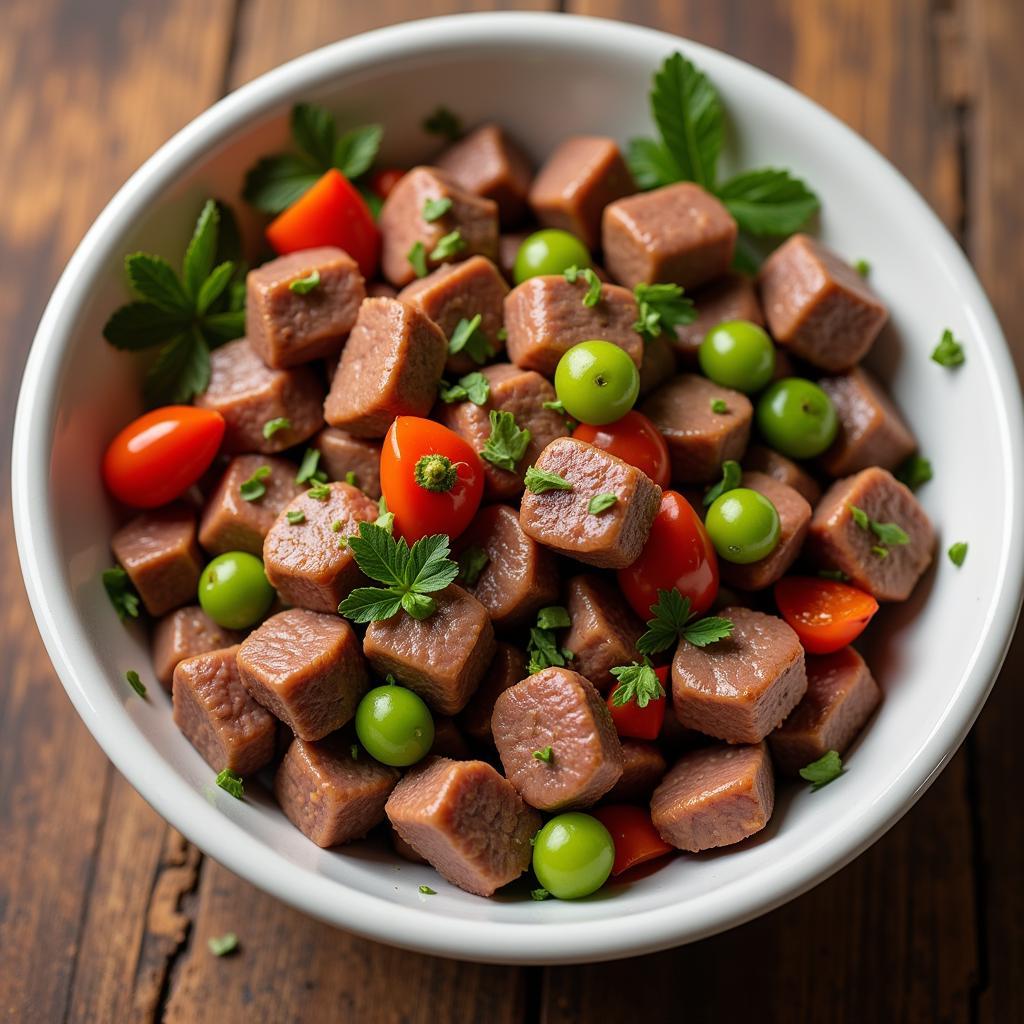Organ Meat Dog Food has been gaining popularity among pet owners, and for good reason. This type of food offers a wealth of nutrients that can significantly benefit your furry friend’s health and well-being. But what exactly is organ meat dog food, and why should you consider incorporating it into your dog’s diet? Let’s delve into the world of organ meats and discover how they can provide your canine companion with the nourishment they need to thrive.
What is Organ Meat Dog Food?
 Organ Meat Dog Food Ingredients
Organ Meat Dog Food Ingredients
Unlike conventional dog food that primarily consists of muscle meat, organ meat dog food focuses on incorporating the nutrient-dense internal organs of animals like cows, chickens, and fish. These organs, often referred to as “offal,” include the heart, liver, kidneys, spleen, pancreas, and even the brain.
While some pet owners may find the idea of feeding their dogs organ meat unappetizing, it’s important to remember that dogs, being descendants of wolves, are naturally scavengers and thrive on a diet that includes these nutrient-rich foods.
The Benefits of Organ Meat for Dogs
 Healthy Dog with a Shiny Coat
Healthy Dog with a Shiny Coat
Organ meats are nutritional powerhouses, packed with essential vitamins, minerals, and amino acids that are crucial for your dog’s overall health. Let’s explore some of the key benefits:
- Rich in Vitamins and Minerals: Organ meats are a concentrated source of essential vitamins, including B vitamins (B12, B6, riboflavin, niacin), vitamin A, and fat-soluble vitamins like D, E, and K. They are also rich in minerals such as iron, zinc, copper, phosphorus, and selenium.
- Excellent Source of Protein: Organ meats provide high-quality, easily digestible protein that is essential for muscle development, tissue repair, and overall growth.
- Supports a Healthy Liver: Liver, in particular, is known for its detoxifying properties and can support your dog’s liver function.
- Boosts Energy Levels: The high concentration of B vitamins in organ meats plays a vital role in converting food into energy, keeping your dog active and full of vitality.
- Promotes Healthy Skin and Coat: Organ meats contribute to a healthy skin and coat due to their abundance of essential fatty acids and vitamins.
Choosing the Right Organ Meat Dog Food
 Different Types of Organ Meat Dog Food
Different Types of Organ Meat Dog Food
When incorporating organ meat into your dog’s diet, you have several options:
- Commercially Prepared Organ Meat Dog Food: Many reputable brands offer complete and balanced dog food formulas that feature organ meat as a primary ingredient. Look for options that list organ meat as one of the first few ingredients on the label.
- Homemade Organ Meat Dog Food: If you prefer to have complete control over your dog’s diet, you can explore homemade organ meat dog food recipes. However, it’s crucial to consult with a veterinary nutritionist to ensure your homemade diet provides all the necessary nutrients in the correct proportions.
- Adding Organ Meat to Your Dog’s Current Diet: You can supplement your dog’s existing diet with fresh or frozen organ meat. Start with small amounts and gradually increase the portion as your dog adjusts.
Addressing Concerns about Organ Meat Dog Food
Some pet owners express concerns about feeding organ meats to their dogs, particularly regarding:
- Vitamin A Toxicity: While organ meats are rich in vitamin A, toxicity is rare and usually occurs with excessive consumption of liver. Choose commercially prepared foods that are properly balanced or consult with a vet regarding appropriate amounts for homemade diets.
- Taste and Smell: Some dogs may be hesitant to try organ meat due to its strong smell and taste. Consider mixing it with their regular food or lightly cooking it to make it more appealing.
Conclusion
Incorporating organ meat into your dog’s diet can provide numerous health benefits, from boosting their energy levels to supporting healthy skin and coat. Whether you choose commercially prepared organ meat dog food, add fresh organ meat to their current diet, or explore homemade recipes, remember to prioritize quality, balance, and consult with your veterinarian to determine the best approach for your furry friend. By understanding the nutritional power of organ meat, you can make informed decisions to support your canine companion’s long-term health and happiness.
FAQs about Organ Meat Dog Food
1. Can puppies eat organ meat?
Yes, puppies can benefit from organ meat, but it’s crucial to introduce it gradually and in appropriate amounts.
2. What types of organ meat are best for dogs?
Liver, kidney, heart, spleen, and pancreas are all nutritious choices.
3. How much organ meat should I feed my dog?
The amount varies depending on your dog’s age, breed, size, and activity level. Consult with your veterinarian for personalized guidance.
4. Is raw organ meat safe for dogs?
Feeding raw meat always carries a risk of bacterial contamination. Consult with your vet to weigh the risks and benefits.
5. Can organ meat upset my dog’s stomach?
Start with small amounts and gradually increase the portion to avoid digestive upset.
Still have questions about incorporating organ meat into your dog’s diet?
Check out our other informative articles:
For personalized advice and to discuss your dog’s specific nutritional needs, contact us:
Phone: 02437655121
Email: minacones@gmail.com
Or visit us at:
Mina Cones Food
3PGH+8R9, ĐT70A, thôn Trung, Bắc Từ Liêm, Hà Nội, Việt Nam
Our dedicated team of pet health enthusiasts is available 24/7 to assist you.